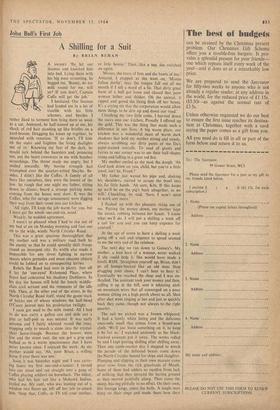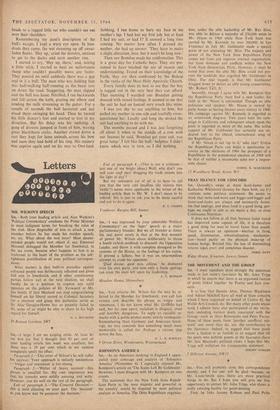John Bull's First Job
A Shilling for a Suit
By BRIAN BEHAN
A SWINEY 'flu.. hit our Seamus and knocked him into bed. Lying there with his big nose streaming, he begged me, 'Boony, do my milk round for me, will ye? If you don't, Captain Cuffe will get the job.'
I hesitated. Our Seamus had landed me in a lot of trouble with his little schemes, and besides I rather liked to torment him lying there as weak as a cat. Annoyed, he half-leaned up at me, his Shock of red hair standing up like bristles on a Yard-broom. Dragging his knees up together, he squealed with vexation. 'If ye don't, I'll hide on the stairs and frighten the living daylights out of ye.' Knowing my fear of the dark, he Would lurk behind the banisters and, pouncing out, put the heart crossways in me with banshee screechings. The threat made me angry, but I smiled inwardly. My bovine strength had triumphed over the quicker-witted Shaybo. Be- sides, I didn't like the Cuffes. A family of all boys like ourselves, they were the lowest of the low. So rough that one night my father, sitting down to dinner, heard a strange picking noise coming from the house next door. It was the Cuffes, who for savage amusement were digging their way from their room into our kitchen.
'All right, I'll keep the job 'warm for you, but I must get the whole one-and-six, mind.'
Weakly, he nodded agreement.
I wasn't so pleased when I had to rise out of my bed at six on Monday morning and face out on to the wide, windy North Circular Road.
This was a great spacious thoroughfare that my mother said was a military road built by the enemy so that he could speedily shift troops round an insurgent city. Its width also made it impossible for any street fighting in narrow Spaces where grenades and more obscene objects could be lobbed on to unsuspecting lorries.
Rebels the Road had seen in plenty. Just off it lay the 'one-eyed' Richmond Place, where Joyce had concocted his shadowy Dubliners. In his day the houses still held the lonely middle- class civil servant and the remnants of the idle rich. Then, at the other end of the street, in the North Circulaf Road itself, stood the gaunt stack of bricks out of whose windows the half-blind Orasey Peered into his proletarian twilight.
I soon got used to the milk round. All I had to do was carry a gallon can and dole out a Pint or half-pint as was needed. It was early autumn and I fairly whizzed round the trees, stopping only to smash a stone into the crystal- clear horse-trough. Because the houses were low and the street vast, the sun got a grip and bathed us in a warm spaciousness that I have never known since. I enjoyed the work. As my mother would say, `Ah, poor Brian, a willing horse if ever there was one.'
Soon it was Saturday night and I was carry- ing home my first one-and-a-tanner. I turned into our street and ran straight into a gang of Cuffes playing soldiers on horseback. The eldest, Who had his hair cut like a Mohawk Indian, Jostled me. My aunt, who was leaning out of a window two floors up, left off her tale to attack him. 'Stop that, Cuffe, or I'll tell your mother, ye little bowsy.' Then, like a tap, she switched on again.
`Missus, the roars of him and the bawls of her.' Amazed, I stopped as she went on, `Missus Julian darlin', may the tongue fall out of me mouth if I tell a word of a lie. That dirty great baste of a bull got loose and chased that poor woman hither and thither. Oh the animal, it ripped and gored the living flesh off her bones. It's a crying sin that the corporation would allow them things to be driv up and down our road.'
Clutching my two little coins, I hurried down the stairs into our kitchen. Proudly I offered up the gold. This was the thing that made such a difference in our lives. A big warm place, our kitchen was a wonderful mass of warm dark shadows that held my mother strong and steady, always scrubbing our dirty pants or me Da's paint-stained overalls. To read of giants and fairies in our corner was to see their half-shapes rising and falling in a great red fire.
My mother smiled as she took the dough. `Ah God look down on you, child, but you're a little jewel, isn't he, Frank?'
My father just waved his pipe and, shaking his shoulders, started to scrape the bowl into his fat little hands. 'Ah sure, Kits. If this keeps up we'll be on the pig's back altogether, so we will.' Chuckling, he said, 'Sure, I won't need to work any more.'
I flushed up with the pleasure rising out of me. Putting the money down, my mother kept the smock rubbing between her hands. 'I know what -we'll do. I will put a shilling a week off a suit for you and you can keep sixpence for yourself.'
At the age of seven to have a shilling a week going off a suit and sixpence to spend seemed to me the very end of the rainbow.
The next day we ran down to Guiney's. My mother, a lean hare of a woman, never walked if she could help it. She would have made a lovely RSM. 'Straighten yourself up, Brian, don't go all humpy-backed like an old man. Stop dragging your shoes, I can't bear to hear it.' Eventually we reached the shop and I was en- thralled. The assistant took your money and then, rolling it up in the bill, sent it whizzing aloft on mountain wires that all converged on a poor woman sitting on a high perch above us all. Shot after shot went ringing at her and just as quickly back they came, though not always to the right quarter.
The suit we picked was a brown whipcord.' It had a lovely white lining and the delicious once-only smell that comes from a brand-new cloth. 'We'll just leave something on it, to keep it by for us.' I watched anxiously as the black- frocked assistant put it away. The weeks rolled by and I kept putting shilling after shilling away. Then one cattle-market day I stopped to watch the parade Of the defeated beasts come down the North Circular bound for ships and slaughter. Plunging and slipping in their own manure came great cows from the rich grasslands of Meath. Some of them had udders so swollen from lack of milking that they sprayed the barren ground as they moved painfully along. Then came the sheep, baa-ing pitifully to no effect. On their own, like foreign kings, came the bulls. A single man hung on their rings and made them bow their heads to a ragged little rat who couldn't see out over their shoulders.
Remembering my aunt's description of the bull's escape, I kept a wary eye open. In hun- dreds they came, the wet steaming up off sweat- laden flanks. 'Hey up,' cried the drovers, anxious to get to the docks and earn another run.
I started to cry, 'Hey up, there,' and, seizing a little stick, I started to beat an unfortunate sheep who couldn't possibly move any faster. They poured on until suddenly there was a gap and in it a bull. The man who was holding him Was half-walking half-running as the beast tore on down the road. Staggering, the man slipped and the bull was loose. Petrified, I ran backwards and fell across the kerb, grazing my elbow and sending the milk streaming in the gutter. For a couple of seconds the bull hesitated and just stood there swinging his head. Then he turned his little dancer's feet and started to trot in my direction. But his delay was his undoing. A gang of drovers jumped in front of him, waving great blackthorn sticks. Another crowd drove a cart they kept for lame animals, across his bow and soon they had hold of his ring. His majesty was captive again and on his way to Oxo-land.











































 Previous page
Previous page